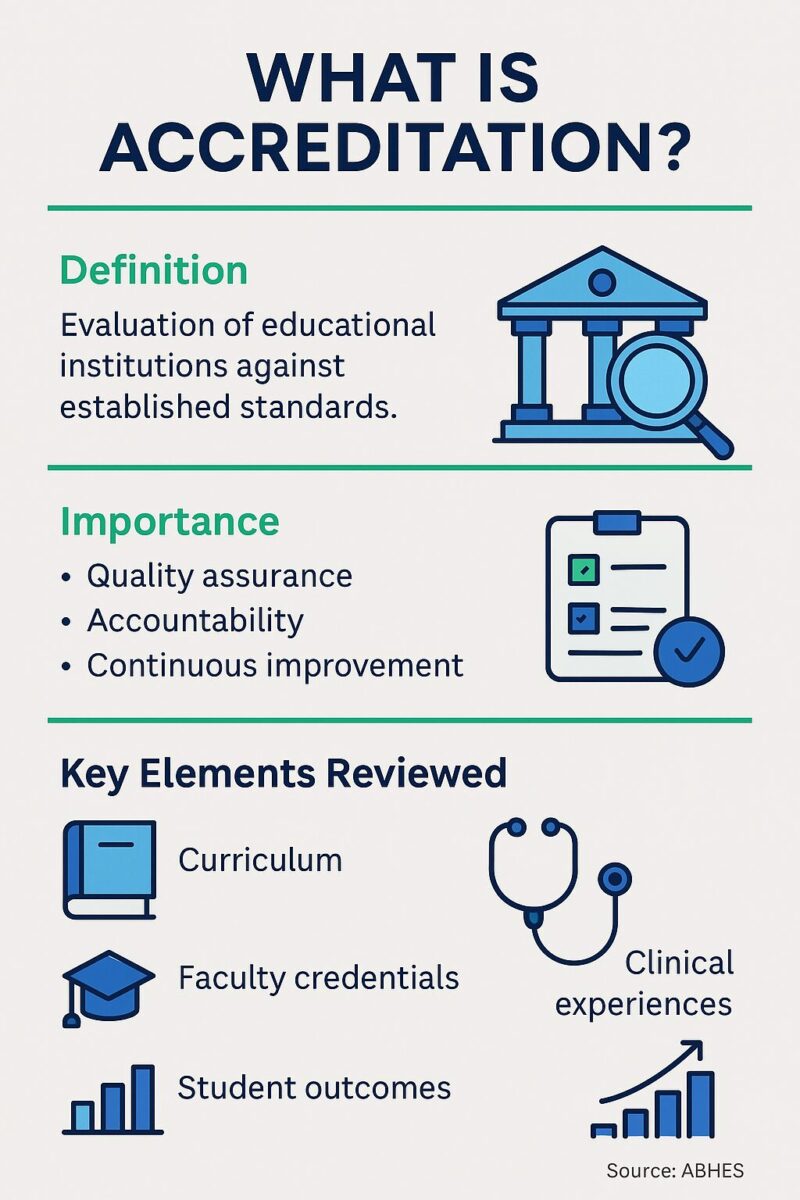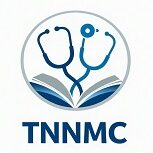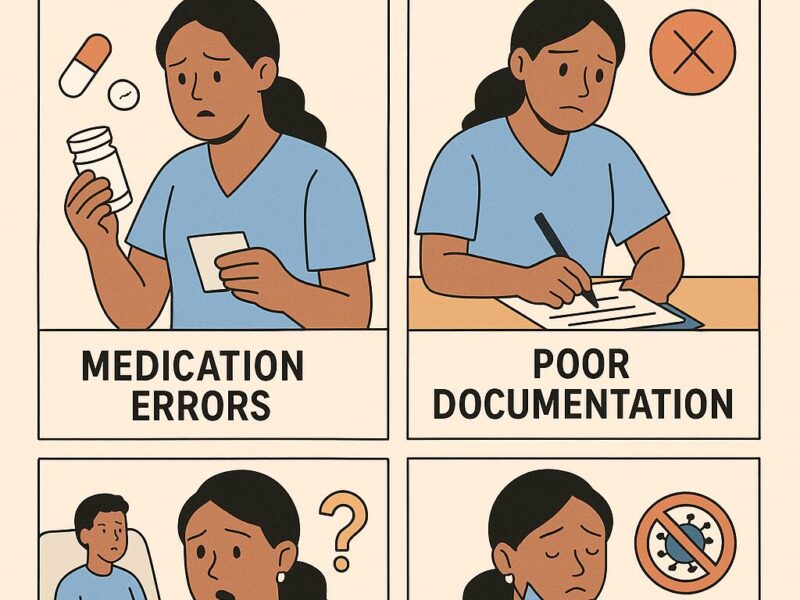The Importance of ABHES and CAAHEP Accreditation
Accreditation in healthcare education is a foundational quality assurance tool that also has downstream benefits for students, institutions, employers and patients. ABHES and CAAHEP are two of the major national accreditors of healthcare education programs. These groups set high standards to ensure educational programs appropriately train students to work in healthcare professions. Prospective students interested in the fields of healthcare education, as well as students, healthcare institutions and employers alike must understand the importance of these accreditations. This article addresses the importance of ABHES and CAAHEP accreditation, important differences between the two accreditors, and the extensive advantages they offer to different stakeholders associated with healthcare education.
What is Accreditation?
Healthcare education accreditation is a process involving the evaluation of educational institutions and programs to determine whether or not they meet certain established standards of quality, which are set by recognized external bodies. This process acts as a tool to hold healthcare institutions, programs, or services accountable to objective standards of excellence peer-reviewed through a formal process, which is a requirement of both the Specialty and Institutional Programs1. Students likewise significant challenges to their education and careers without proper accreditation such as trouble seeking employment, transferring credits to other institutions, and obtaining financial bursaries1. Furthermore, some states do not grant eligibility to sit for licensing exams, including the National Council Licensure Examination for Registered Nurses (NCLEX-RN)1, to nursing graduates of unaccredited programs.
The process of accreditation typically includes thorough assessments of several elements such as the curriculum design, faculty credentials, clinical experiences, and student outcomes. These standards ensure that graduate programs provide students with a quality education that meets or exceeds benchmarks in the healthcare field. Scope of Practice This process is essential to uphold the integrity of healthcare credentials and protect the public by promoting practice that is safe and effective for users of the health care system.

Accreditation helps maintain a culture of continuous improvement within an educational institution, through regular reviews and assessments that highlight areas for development. Continuing to improve quality assurance in health care education ensures its responsiveness to changing health care requirements, new technological developments and educational development. Accreditation standards do not remain static, so they are revisited on a periodic basis to ensure that programs are responsive to how healthcare delivery models have evolved and that students are calibrated with the ever-evolving complexities of the healthcare landscape.
What is ABHES?
The Accrediting Bureau of Health Education Schools (ABHES) is a private, nonprofit, independent accrediting agency, recognized by the U.S. Secretary of Education, that specializes in the accreditation of healthcare education programs. Founded as the Accrediting Bureau of Medical Laboratory Schools in 1964, it changed names to its current one in 1974 to more accurately reflect the breadth of its scope and activities. ABHES is recognized as a national leader in the accreditation of quality healthcare education and the sole healthcare education accrediting agency recognized by the U.S. Department of Education.
Through regular and consistent program evaluation, “ABHES improves the quality of education and training and encourages institutional and programmatic accountability,” according to its official website. Its key role is to assure the quality of the programs it accredits and help improve the programs. This determination of quality is made through thorough and systematic review using valid criteria” Recognition, resources, and service are the three main tenets of the organization, as these are mission-critical in advancing quality healthcare education1.
Both institutional and programmatic accreditation are done by ABHES. Institutional accreditation evaluates entire educational institutions in a holistic manner, whereas programmatic accreditation pertains to specific healthcare programs within an educational institution. ABHES accredits programs based on a set of standards2. These standards cover program goals and oversight, curriculum, competencies, clinical experience, instruction, student assessment, program management and faculty qualifications, safety, student and graduate services, disclosures, program effectiveness, and student record management1. These broad standards help ensure that accredited institutions and programs uphold high quality educational offerings, as well as accountability.
What is CAAHEP?
CAAHEP (Commission on Accreditation of Allied Health Education Programs) CAAHEP is a programmatic accreditor that focuses on college-based health science programs. In Clearwater, Florida, CAAHEP is an independent, not-for-profit organization and a member of the Council for Higher Education Accreditation (CHEA). CAAHEP, the nation’s largest programmatic accreditor in the health sciences field, establishes national standard of education, and reviews and accredits more than 2,100 individual education programs in 32 health science occupations.
Its mission is to evaluate health professions programs to ensure they meet established consensus standards and guidelines relevant to each profession. The organization focuses on four core values: integrity, collaboration, accountability, and consensus, which are reflected in its accreditation processes and decision-making1. When an education program in a health science profession pursues CAAHEP accreditation, it directly partners with that profession’s Committee on Accreditation (CoA), which assesses the program against discipline-specific standards.
CAAHEP has also historical roots dating back to the early accreditation efforts in the medical field. In 1904 the American Medical Association created its Council on Medical Education, which devised a system for rating medical schools, and began inspections that led to specialized accreditation in the education of health professions. 3. The outcome is CAAHEP’s current emphasis on accreditation as a granular validation process to determine that graduates of accredited programs have the knowledge, skills, and competencies essential for practice in their respective scientific domains.
Distinguishing Factors Between ABHES and CAAHEP
Although ABHES and CAAHEP are both accrediting organizations recognized nationally for their contribution to healthcare education, there are differences that you should be aware of. The biggest difference between the two is accreditation scope: ABHES is both an institutional accreditor and a programmatic accrediting body, while the CAAHEP is a programmatic accrediting organization only. This distinction allows ABHES to accredit entire institutions as well as individual programs, whereas CAAHEP is limited to programmatic accreditation.
Specific to the recognition, the ABHES is the only agency of its kind in healthcare education recognized by the U.S. Department of Education. However, both organizations are still recognized by professional associations across the healthcare sector. AAMA Certifying Board,AMT, LLC-ST. CAAHEP, on the other hand, is CHEA recognized.
Their governance structures, too, are different. CAAHEP is governed by a commission and a board of directors, which consists of commissioners from CAAHEP’s sponsoring organizations, recent graduates of CAAHEP-accredited programs, and members of the general public. The commissioners approve the mission, vision, and bylaws of the organization and decide which health science professions are eligible to enter the CAAHEP accreditation system. On the other hand, ABHES follows a relatively centralized accreditation approach, albeit maintaining similarly high standards for the evaluation and advancement of health care education programs.
Advantage of Accreditation for Students
Attending an accredited school is one of the best things you can do for yourself as a budding member of the health care community. Most importantly, accreditation serves as a quality assurance, providing students with certainty that their educational program adheres adherence to a rigorous set of quality standards. This quality assurance function builds confidence in the educational process and encourages students to achieve their best academic performance, knowing that they have access to appropriate and high-quality instruction that will properly prepare them for the healthcare professions. Students are guaranteed that curriculum content, instructional delivery, and clinical experiences have been reviewed against recognized standards for their respective healthcare field.
Improved employability in the competitive health care industry is another major advantage. Employers, in general, also prefer students graduated from an accredited program and thus, an accreditation provides an edge over others in the job sector. Graduates of accredited programs are often the first candidates considered by hiring managers in healthcare organizations and facilities, because they can be confident these graduates received education consistent with industry standards and best practices. This bias manifests in graduates of accredited programs having significantly improved job market opportunities and often better employment conditions than those of non-accredited institutions.
It also promotes academic transfer and career enhancement opportunities. Accredited programs make it easier for students to transfer their credits to another accredited institution and continue their education without taking the same classes over again. 1 And, accreditation allows individuals to pursue further education, such as graduate programs, specialty certifications or advanced practice roles. Participating in WGU’s Teaching program, for example, accredited nursing schools have a direct feed into graduate education and specialized roles in healthcare settings. Lastly, accredited programs contribute to the global recognition and transferability of healthcare credentials, facilitating graduates to seek career opportunities worldwide or engage in international health projects.
The Advantage of Accreditation for Institutions and Employers
Academic institutions benefit greatly from acquiring and retaining ABHES or CAAHEP accreditation. This serves as a public acknowledgment of an institution’s dedication to educational quality and continuous improvement. Accreditation advocates for the continuous assessment of programs and pathways that would lead an institution to better educational quality through improvements. This culture of continuous improvement ensures that institutions stay afloat with changing healthcare demand, technology upgradation and best practices in imparting education.
For employers, being able to hire graduates from accredited programs gives them a greater level of reassurance regarding skills and preparation. Since certain healthcare roles (like medical assistants) often have no-level licensing requirements, employers use program accreditation as a trusted sign of quality training. Indeed a rising number of malpractice insurance providers are also requiring medical assistants to be credentialed through an accredited training program based on the knowledge that credentialed staff lowers the likelihood of successful attack on work quality of an employee. The risk management aspect also makes graduates from accredited programs very attractive to healthcare employers.
Another benefit of accreditation is that it helps in meeting industry regulations and standards. By employing graduates from accredited programs, healthcare facilities can showcase their commitment to providing quality care in line with established professional standards, which can positively impact their own accreditation or certification. Further, programs with accreditation status tend to build stronger relationships with clinical sites and community partners, which opens doors for student placements and potentially informs future recruitability of graduates. This is a win-win for all involved!”Accreditation in healthcare education is a positive cycle; it takes strong regulatory and educational partnerships to not only see the benefits but to ensure that these partnerships deliver.
The Accreditation Process
ABHES and CAAHEP both hold rigorous processes of evaluation of prospective programs to those established standards. For ABHES it is a systematic and systemic approach for program evaluation along the valid standards on many fronts from curriculum, instruction, and assessments to program management, safety protocols, and student services1. Like, CAAHEP reviews programs based on discipline-specific standards and guidelines adopted by the professionals in each healthcare field.
Accreditation is a voluntary, non-governmental process that helps ensure that institutions meet specific standards of quality. Programs must use this self-study moment to critically assess their operations, curriculum, resources, and outcomes. Prospective schools, following their self-study efforts, undergo site visits by peers in accrediting bodies who check facts presented in the self-study and see the program quality up close. Such site visits usually consist of the observation of the classroom, teaching, and learning environments, meetings with faculty, students, and administrators, and the review of additional documentation and evidence.
Once evaluated, accrediting bodies determine whether an academic program is in accordance with defined criteria, applying the necessary actions to the program. All of the organizations had applied for a full accredited program, which means they met all of the standards; full accreditation with deficiencies, which means they did not meet all the standards within a specific timeframe; or full accreditation denied. Accreditation is not a one-time achievement for any higher education institution, for it entails continuous compliance with these expectations and periodic renewal, which is accompanied by a similar comprehensive evaluation of the institution as a whole. This upholds a standard of excellence for programs and represents the changing landscape of health care practice and education.
Foundational in Nursing and Allied Health Education
In graduate nursing education, the role of accreditation is critical, since accreditation has direct bearing on graduates’ eligibility for licensure and successful employment. Introduction The Commission on Collegiate Nursing Education (CCNE) and the Accreditation Commission for Education in Nursing (ACEN) are the two main nurses accrediting organizations for registered nurses and graduate nursing programs1. While ABHES and CAAHEP are significant accreditation organizations, this “tainly would not suffice for RN and graduate nursing programs.” Rather, they have prominent roles in the accreditation of the many allied health programs, including medical assistant, medical laboratory technology and surgical technology programs.
Accreditation also determines which certification examinations graduates of your medical assistant programs qualify for. The certification exam for Certified Medical Assistant (CMA – AAMA), which is often regarded as the gold standard for medical assistant certifications, is only available to graduates of CAAHEP- or ABHES-accredited programs. “The CMA is the only exam requiring graduates of a medical assistant program that is accredited with the CAAHEP or ABHES programs” on Oct. 2, according to the Hunter Business School. This precludes many job opportunities for medical assistants, since a number of employers only want to hire those that already have their CMA.
More than just for nursing and medical assisting, CAAHEP accredits thousands of programs in a wide variety of health-related disciplines, including ST/advanced cardiovascular sonography, blood bank technology, art therapy, anesthesiologist assistance and clinical research, to name just a few. This level of oversight ensures the maintenance of quality standards across the varied landscape of allied health education. And ABHES accredits many allied health programs in institutions all over the country, like those from American Career College, Brookline College, ECPI, Fortis Institute, Pima Medical Institute, and more.
Accreditation Challenges and Considerations
Though accreditation provides many advantages, there are significant challenges that educational institutions must address when seeking accreditation and working to achieve and maintain their status. Accrediting a university is an intense process that requires a lot of time, personnel, and money from the institution. Facilities and resources need to be hired or built, application and site visit fees paid, and program adjustments (flexible enough to meet the new standards) implemented. For smaller institutions that may be limited in their resources, these requirements could prove especially prohibitive and might create disparities when it comes to applying for accreditation.
Simultaneously, the breadth of accreditation standards presents challenges in that programs should show evidence of meeting several dimensions at the same time. Compliance with the standards on curriculum, faculty qualifications, facilities, clinical experiences, and student outcomes demands collaboration across different institutional departments and stakeholders. Accreditation standards also change over time, responding to shifts in healthcare practice and education, which means that programs must continually revise their approaches to remain in compliance.

Accredited programs are not created equal — prospective students should evaluate several different factors. Because different accrediting bodies emphasize different aspects of educational quality, and because the accreditation most relevant to a student’s career goals can depend on the profession, accreditation isn’t a one-size-fits-all determination. Students should determine, by whom, and what type of accreditation is most accepted and valued in their field of practice. Moreover, you should make clear to students that although accreditation is an important consumer protection, the existence of an accredited institution does not guarantee that a particular student will be successful or that a certain job will be available to them. Educational decisions also should be guided by other factors, including location, the cost of the program, its delivery format, and the reputation of the institution.
Conclusion
The N/A accredited by ABHES and CAAHEP is to ensure that the healthcare education programs offered by the N/A is the quality education in the United States. Accrediting bodies help set the tone for well-defined standards to serve all of these stakeholders — students get access to quality education with better career opportunities, institutions have shown their commitment to educational differences, employers can be confident in their hiring of students with valid competencies, and patients get the rest from well-prepared professionals in health care.
In particular, the differences between ABHES and CAAHEP—in terms of ABHES providing institutional and programmatic credentials, while CAAHEP only for programmatic credentials across a great variety of health disciplines—offer complementary perspectives for quality assurance in health education. Though they differ in some respects, both play an important role in ensuring that the training of healthcare professionals meets quality standards.
In a healthcare environment that is growing more complex by the day due to rapid technological advancements and changes in practice models, the importance of accreditation is amplified. Healthcare education is constantly evolving in response to the demands of the profession, and ABHES and CAAHEP accreditation will continue to provide critical mechanisms for ensuring that educational institutions are aligned with industry expectations and preparing students for success in their careers. If you are a prospective student, you should know that accreditation should be an important factor when choosing to enroll in healthcare education programs, as this will have an overall impact on their professional life and career opportunities.



